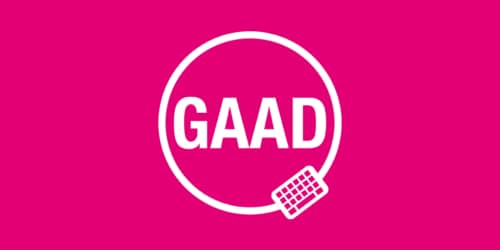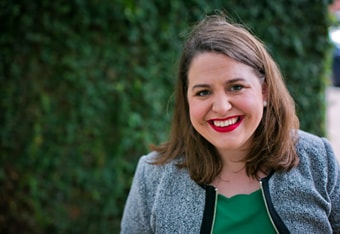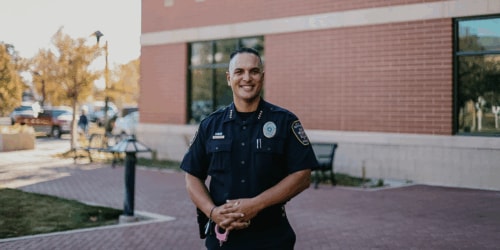I walked into my first day of high school in 2015 feeling unconfident, un-liked and unsure of what the future would bring.
My mind raced with crushing doubt. Would I survive academically? Socially? I know high school is a scary rite of passage for most, but throughout my life I was continuously tested for learning disabilities, provided accommodations and sat through countless Individualized Education Plan (IEP) meetings. I was often told aiming within my “abilities” meant solely graduating high school and finding a job. When I argued that I wanted more for myself, I was met with blank stares and shrugs.
I was frustrated not only with my learning challenges, but with the systems in place that prioritized adult decision-makers choosing my educational path instead of asking me. I knew if I did not take ownership of my academic future, it would be decided for me. I took a more decisive role in better understanding the intricacies behind my own IEP and the legislation behind it. This self-advocacy empowered me to feel unafraid to demand what I needed to succeed. I entered college determined to do my part in advocating and supporting fellow students with disabilities.
I began my advocacy work in the most natural of places — in a legislator’s office. I interned for United States Senator Patty Murray’s office during the summer of 2021. There, I got my first glimpse of how real societal change comes to life, and I never would have had this opportunity if it weren’t for the American Association of People with Disabilities (AAPD).
AAPD is a national cross-disability civil rights organization that focuses on building the economic and political power of the 61 million disabled people across the country. As a member of their Summer Internship Program, my peers and I had access to an entire network of employment opportunities, including my internship in the federal government. I also have this program to thank for my most current internship at T-Mobile working in Corporate Communications, an experience has been incredibly valuable to me as I explore a career where I can help share stories with a broad audience in ways that create impact and drive change.
As I soak in every moment of my experience learning more about my own career passions in communications, while also supporting T-Mobile in its mission of being an ally to the disability community, I wondered if the opportunity to be an agent of awareness was right in front of me.
So, I reached out to Maria Town, President and CEO of AAPD, to learn more about what it takes for an organization to be a stronger ally and to discuss her life and career path in disability justice, her current work at AAPD and what roles she believes large companies like T-Mobile play in employing, mentoring and advancing people in the disability community.
An extremely important advocate for the community, Maria has served as the Director of the City of Houston Mayor’s Office for People with Disabilities and is a former Senior Associate Director in the Obama White House Office of Public Engagement.
What gives you the dedication and drive to work every day advocating for the rights and inclusion of people with disabilities?
One thing that I love about AAPD is that we are led and staffed entirely by people with disabilities. I am disabled myself; I have cerebral palsy. This is a disability I was born with and have lived my whole life with. I have always had to advocate for myself and for my inclusion in mainstream society, whether that was in school, in things like Girl Scouts, and in the workplace. I’m lucky to work in a field and in a role that is so deeply personal to me. Sometimes that makes the work hard.
When I was growing up, I did not see a lot of people like me in the world. I was the only child with a visible disability in most of my classes, all the way through college. I didn’t see anyone who was working in advocacy or in policy full time. The world of policy as a career was not available to me. I got into my career because of people who were part of my journey and who connected me to people they thought I would like and who I could learn from.
One of the signature programs that AAPD coordinates is the Summer Internship Program, which is celebrating its twentieth anniversary this summer. I took part in the program and benefitted greatly. Can you tell us a bit about this program, and why you believe it has been and continues to be so pivotal for young adults with disabilities?
The AAPD Summer Internship Program selects students and recent graduates with disabilities and places them in internships. All the interns have very different disabilities and are varying ages from post-secondary programs to those who are pursuing their PhD’s. Because the disability community is so unique and diverse, we want to include as many people as possible – so we cover transportation, housing, technology, food, and provide them with paid internships to make it seamless and easy.
Internships are vital career development opportunities for not only young people, but anyone who is trying to figure out their career. Students are placed in an internship and paired with a mentor. They also participate in the disability advocacy certificate program to deepen their awareness of disability history, key issues and what it means to be an advocate and tell your story.
Twenty years later, this program is still critically important because even though the Americans with Disabilities Act has existed for more than thirty years, we continue to see huge gaps in disability employment. The gaps in disability employment reflect gaps throughout the systems in education, career development and learning that people participate in before they get a job. We need the AAPD internship program to exist and grow so that more young career professionals with disabilities can get these experiences.
Recently, we have seen an increase in disability representation in the media such as the film CODA winning the Oscar for best picture, which is helping more people around the country be more understanding of people with disabilities. What do you believe companies such as T-Mobile can do to add to this awareness?
I believe companies like T-Mobile should seek to hire people with disabilities in every job level from frontline customer service positions to corporate executives and invest in advocacy and mentorship. For example, I would have never been able to work at the White House without Claudia Gordon, T-Mobile’s Senior Accessibility Strategy Partner who is my dear friend. Seeing her in that space and knowing that I could do that work as well was vital for me. Also, when I was offered the position in the White House, I was intimidated, and imposter syndrome set in! But Claudia took me to lunch and said, “You can do this!” Having people that believe in your abilities and worth is vital, and we all need to support people in their goals and aspirations. Not only is advocacy critical, but it’s also important for companies to host companywide celebrations for key disability events or bring in speakers to come share knowledge, so that everyone can learn that having disability is about far more than needing special accommodations and assistive technology. Getting employees and everyone at your company to understand the culture around disability is key.
What advice do you have for young people who are reading this article and have had the same thoughts of self-doubt in achieving their own personal and professional goals?
I feel like today’s younger generation could give me the most valuable advice, and that makes me hopeful and inspired. Young people today have greater access to information about disability and the disability community than I ever did. Part of that is because of social media and the way communities are formed via the internet and technology and use of mobile devices. If I had to give any advice, I would quote one of my favorite poems, which is “You Get Proud by Practicing” by Laura Hershey.
One of my favorite lines in it is, “Remember you were not the one who made you ashamed.” Even though I have had my disability my whole life, there are moments when I get really frustrated, whether it’s with my body just not doing what I want it to do or with the outside world not accepting me as I am. Those are all moments where I practice my pride
As you figure out who you are, what it is you want to do, and who you want to be in the world, it’s okay to try something and decide it’s not for you. It is okay to take risks and make mistakes. As disabled people, I think we must deal with the reality that we aren’t given much grace to make mistakes, because we have to try so hard to overcompensate for a perceived deficit. There is a community of fantastic people out there who want to support you and are willing to reach out if you’re willing to reach back. I would point them to our internship program or many similar programs on our website.
—
As T-Mobile’s collaboration with AAPD continues to grow, so does its pipeline of unique, diverse young talent. I am incredibly grateful for the support I’ve received from my experience with both organizations, and I’m thrilled to share that another fellow AAPD intern will be joining T-Mobile’s Summer 2022 internship program – ranked among the best in the nation!
If you share T-Mobile’s passion, ambition, and desire to do things differently, check out the T-Mobile career diversity and internship pages to keep up to date with the latest career opportunities. Customers can also learn more about T-Mobile’s accessibility accommodations through our support page here.





